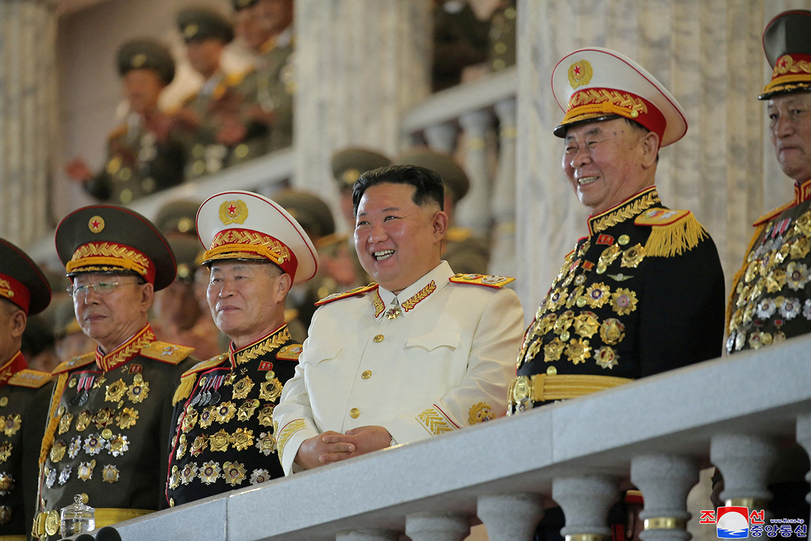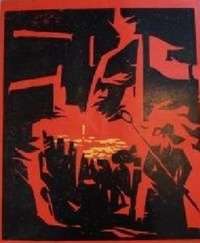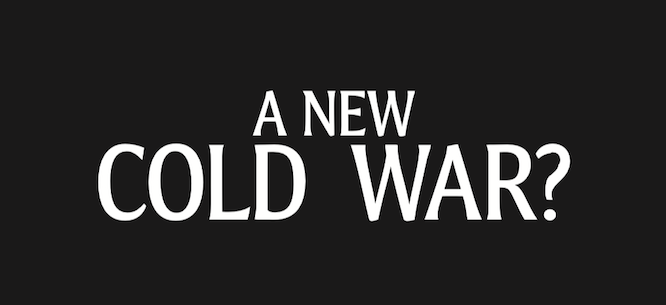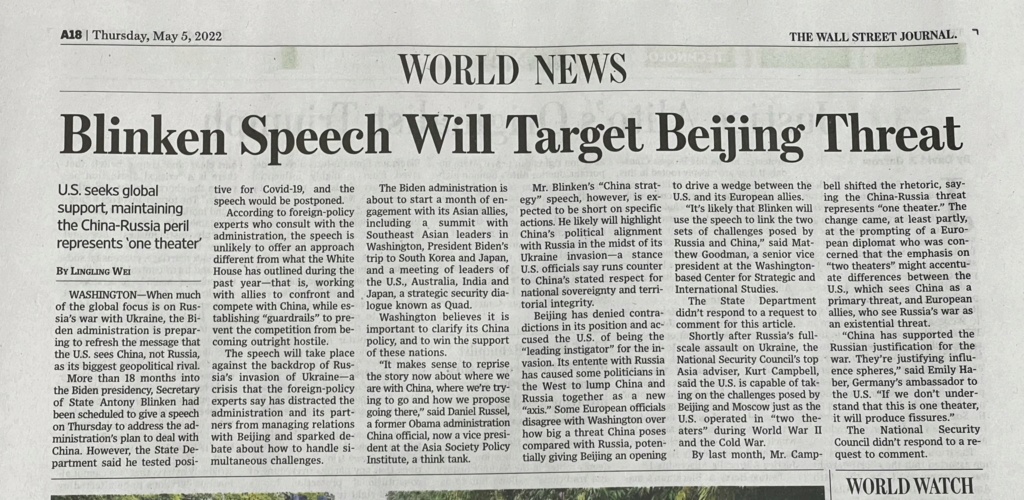
The New Cold War

- Posts : 10464
Join date : 2020-06-19
- Post n°301
 Re: The New Cold War
Re: The New Cold War

_____
Međuopštinski pustolov.
Zli stolar.

- Posts : 7331
Join date : 2019-11-04
- Post n°302
 Re: The New Cold War
Re: The New Cold War
US won’t rule out military action if China establishes base in Solomon Islands
One of the most senior US officials in the Pacific has refused to rule out military action against Solomon Islands if it were to allow China to establish a military base there, saying that the security deal between the countries presented “potential regional security implications” for the US and other allies.
Ambassador Daniel Kritenbrink, assistant secretary of state for East Asian and Pacific Affairs, was part of a high-level US delegation to the Pacific country last week.
...
“Of course, we have respect for the Solomon Islands sovereignty, but we also wanted to let them know that if steps were taken to establish a de facto permanent military presence, power projection capabilities, or a military installation, then we would have significant concerns, and we would very naturally respond to those concerns,” he said.
When asked what that response could involve, he said: “Look, I’m not going to speculate and I’m not in a position to talk about what the United States may or may not do in such a situation.”
Pressed on whether he would rule out the prospect of the US taking military action against Solomon Islands were a naval base to be established, and, if not, whether he was comfortable with Australian prime minister Scott Morrison’s talk of the base being a “red line” for Australia, he said: “I don’t have a lot to add beyond what I’ve already stated.”
...
The rhetoric escalated in the wake of the statement, with the Australian prime minister, Scott Morrison, saying Australia had “the same red line” as the US when it came to China’s involvement in Solomon Islands, and defence minister Peter Dutton using his Anzac Day address on Monday to declare: “Australia should prepare for war”, claiming that China was “on a very deliberate course at the moment”.
...
https://www.theguardian.com/world/2022/apr/26/us-wont-rule-out-military-action-if-china-establishes-base-in-solomon-islands
One of the most senior US officials in the Pacific has refused to rule out military action against Solomon Islands if it were to allow China to establish a military base there, saying that the security deal between the countries presented “potential regional security implications” for the US and other allies.
Ambassador Daniel Kritenbrink, assistant secretary of state for East Asian and Pacific Affairs, was part of a high-level US delegation to the Pacific country last week.
...
“Of course, we have respect for the Solomon Islands sovereignty, but we also wanted to let them know that if steps were taken to establish a de facto permanent military presence, power projection capabilities, or a military installation, then we would have significant concerns, and we would very naturally respond to those concerns,” he said.
When asked what that response could involve, he said: “Look, I’m not going to speculate and I’m not in a position to talk about what the United States may or may not do in such a situation.”
Pressed on whether he would rule out the prospect of the US taking military action against Solomon Islands were a naval base to be established, and, if not, whether he was comfortable with Australian prime minister Scott Morrison’s talk of the base being a “red line” for Australia, he said: “I don’t have a lot to add beyond what I’ve already stated.”
...
The rhetoric escalated in the wake of the statement, with the Australian prime minister, Scott Morrison, saying Australia had “the same red line” as the US when it came to China’s involvement in Solomon Islands, and defence minister Peter Dutton using his Anzac Day address on Monday to declare: “Australia should prepare for war”, claiming that China was “on a very deliberate course at the moment”.
...
https://www.theguardian.com/world/2022/apr/26/us-wont-rule-out-military-action-if-china-establishes-base-in-solomon-islands

- Posts : 22555
Join date : 2014-12-01
- Post n°303
 Re: The New Cold War
Re: The New Cold War
Mislio sam da Solomonska ostrva mogu sama da biraju i odlucuju sta ce, kako ce i sa kim ce, te da spoljni akteri nemaju prava da se mesaju u njihov izbor i odluke koje se ticu njihovih teritorija.

- Posts : 7331
Join date : 2019-11-04
- Post n°304
 Re: The New Cold War
Re: The New Cold War
Opinion Is this the Western alliance’s last hurrah?
By Henry Olsen
April 25, 2022 at 9:37 a.m. EDT
The unity of Western democracies in response to Russia’s invasion of Ukraine is marvelous and long overdue. But these nations’ fading economic power might mean this is the old order’s last hurrah.
Economic power is what allowed Europe and the United States to dominate the globe. The development of modern science and the Industrial Revolution gave Europe and its American offshoot the economic ability to deploy overwhelming military power, allowing them to wrap most of the planet into their sphere of influence, often by bludgeoning nations such as China into submission.
The liberal, rules-based international order that arose in the latter part of the 20th century rested on those nations’ continued global economic dominance. Other nations became richer, but Western Europe, the United States and their Asian allies remained far ahead. By 1950, the United States alone had a larger gross domestic product on a purchasing power parity basis than China, India and Russia combined. Add in the rest of NATO and its Asian allies, and no power could successfully resist their combined might.
That dominance was confirmed and extended by the collapse of the Soviet Union in 1991. Former Soviet satellites in Eastern Europe joined the European Union, while other nations liberalized their economies and became Western trading partners. In 2000, the nations that are currently imposing sanctions on Russia — the European Union and most NATO nations, plus Japan, South Korea, Australia, New Zealand, Taiwan, Switzerland and Singapore — produced 79.4 percent of global GDP.
Globalization has severely diminished that power in the past 20 years. By 2020, those same nations produced only 60.4 percent of global GDP. China’s meteoric rise accounts for much of that, but India and other developing countries have grown faster than the West, too. Those nations are now powerful enough to resist even the combined power of the West regarding its conflict with Russia. This is why many of these nations abstained on U.N. resolutions condemning the invasion and why they refuse to sanction Russia for its aggression.
These trends are likely to continue. If we focus on just the 30 largest economies, the International Monetary Fund estimates that nations sanctioning Russia currently make up 64.9 percent of economic production. By 2027, it projects that number will fall to 58.5 percent. By 2040, China and India together are projected to have a larger GDP on a purchasing power parity basis than the United States and the eight largest other sanctioning nations combined. Add in other emerging powers such as Brazil, Mexico, Indonesia and Turkey, and the global balance of power will no doubt shift even more.
This development will end two centuries of Western global dominance unless some of these rising powers join our club. If today’s non-sanctioning powers create an informal alliance to compete with and displace the West, expect the 21st century to be one of rising political and military tensions. Preventing that is the sine qua non of Western statesmanship for the foreseeable future.
The West starts with some important advantages in this quest. India is a historic rival of China. It is also a democracy, even if a chaotic one at times. Western criticism of Hindu nationalism, which appears to be the dominant political movement in India for the foreseeable future, risks driving that crucial nation away from us. Prudence dictates that we maintain the alliance, even if it makes Westerners uneasy.
Similar conflicts between Western liberal social values and Western geopolitical interests must be managed elsewhere. Brazil’s development of its massive rainforest angers climate activists. India and Brazil also house more than half of the world’s cattle, a leading source of methane emissions. Do we want climate activism to drive these nations into China’s arms?
Western views on homosexuality could also complicate our geopolitics. Nigeria, for example, will be one of the world’s 15 largest economies and Africa’s largest by 2040. It, along with many other Islamic and African nations, criminalizes same-sex relations. Noxious, yes, but should we allow the issue to alienate Nigeria from the West? China’s rise means these nations will have an alternative for development funds and product exports. And China’s authoritarians certainly won’t require its allies to adopt human rights reforms.
Thucydides’ maxim remains true: The strong do what they can, and the weak suffer what they must. The West has been the global strongman for more than two centuries. Unless we adapt now and prepare for the future, today’s united response to Russia could be the West’s swan song.
https://www.washingtonpost.com/opinions/2022/04/25/is-this-the-western-alliances-last-hurrah-ukraine-russia/

- Posts : 52642
Join date : 2017-11-16
- Post n°305
 Re: The New Cold War
Re: The New Cold War
[size=36]This development will end two centuries of Western global dominance unless some of these rising powers join our club.[/size]
Upravo
If today’s non-sanctioning powers create an informal alliance to compete with and displace the West,
Ovo je a tall order, u najmanju ruku
Last edited by Mór Thököly on Wed Apr 27, 2022 8:39 am; edited 1 time in total

- Posts : 52642
Join date : 2017-11-16
- Post n°307
 Re: The New Cold War
Re: The New Cold War
Mislim, kako ce da "ujedine" Indija i Kina u bilo cemu, ovo po pitanju Rusije imaju separatne interese koji se vise.mogu opisati kao wild agreement. Brazilske brige tek nemaju nikakve veze sa ove dve zemlje. Turska je NATO zemlja.
Druga stvar, ono sto se uvek zaboravlja - GDP je naravno vrlo bitan, ali "wealth" je takodje bitan. Pa onda soft-power.
Drugo, sea-denial je sve vazniji, ali on je vazan u ratu pre svega.Sea-control ne vidim ko ce uskoro zameniti kombinovanu moc svih zapadnih zemalja, Plus te zemlje naravno da imaju i sea-denial moc. A ko kontrolise svetske okeane realno drzi noz i pogacu svetske trgovine.
Ono sto je realna i najveca opasnost je preticanje u novim tehnologijama. To je pravi osnov za neku geopoliticku revoluciju, to je opasno za dominantnu poziciju. Ali to preticanje mora da bude znacajno.
Druga stvar, ono sto se uvek zaboravlja - GDP je naravno vrlo bitan, ali "wealth" je takodje bitan. Pa onda soft-power.
Drugo, sea-denial je sve vazniji, ali on je vazan u ratu pre svega.Sea-control ne vidim ko ce uskoro zameniti kombinovanu moc svih zapadnih zemalja, Plus te zemlje naravno da imaju i sea-denial moc. A ko kontrolise svetske okeane realno drzi noz i pogacu svetske trgovine.
Ono sto je realna i najveca opasnost je preticanje u novim tehnologijama. To je pravi osnov za neku geopoliticku revoluciju, to je opasno za dominantnu poziciju. Ali to preticanje mora da bude znacajno.

- Posts : 22555
Join date : 2014-12-01
- Post n°308
 Re: The New Cold War
Re: The New Cold War
Mór Thököly wrote:
Drugo, sea-denial je sve vazniji, ali on je vazan u ratu pre svega.Sea-control ne vidim ko ce uskoro zameniti kombinovanu moc svih zapadnih zemalja, Plus te zemlje naravno da imaju i sea-denial moc. A ko kontrolise svetske okeane realno drzi noz i pogacu svetske trgovine.
Pomorska sila je bitnija za projektovanje moci. No, mislim da se blizi kraj tim kantama. Ukoliko je tacno da ove protivbrodske rakete nove generacije imaju takvu moc kakva se tvrdi, brodovi ce biti samo kante koje cekaju da budu olupane. U neku ruku je to i Moskva pokazala, ali bi se jos bolje videlo u nekom jacem konfliktu gde i jedan Mig29 moze da ponese Kinzale ili sta-ti-ja-znam koje sve projektile i ispali ih sa bezbedne udaljenosti na nosace aviona i ispotapa sve sto pogodi. Na taj nacin ce sa kopna moci itekako da se kontrolise ogroman obalski pojas, sasvim dovoljan da ne moze neki viking iz los andjelesa da ti blokira malezijski tesnac samo zato sto je parkirao 7 kanti tamo.

- Posts : 8696
Join date : 2016-10-04
- Post n°309
 Re: The New Cold War
Re: The New Cold War
МиГ-31 и Ту-22 носе Кинжал, који није противбродска ракета.
Руси још нису представили своју балистичку противбродску ракету на тој основи.
Направили су је Кинези и Иранци, питање је како ради. Кинжал би могао да ради сасвим добро, има и мамце, велику брзину, али је компликовано да се направи да погоди покретну мету. То је питање како ради.
Руси још нису представили своју балистичку противбродску ракету на тој основи.
Направили су је Кинези и Иранци, питање је како ради. Кинжал би могао да ради сасвим добро, има и мамце, велику брзину, али је компликовано да се направи да погоди покретну мету. То је питање како ради.

- Posts : 22555
Join date : 2014-12-01
- Post n°310
 Re: The New Cold War
Re: The New Cold War
Ma dobro, ja se ne razumem previse u hipermoderno naoruzanje, koja god raketa u principu da je u pitanju, vise govorim o principu.

- Posts : 7331
Join date : 2019-11-04
- Post n°311
 Re: The New Cold War
Re: The New Cold War
America Has Stopped Playing by the Monetary Rules
Apr 27, 2022
YU YONGDING
The international financial and monetary system ultimately operates on trust, with all participants assuming that others will play by the rules. By unilaterally freezing Russia's foreign-exchange reserves, the United States has powerfully undermined its own credibility, not least in China.
BEIJING – In The Economic Weapon: The Rise of Sanctions as a Tool of Modern War, historian Nicholas Mulder reminds us that even when Britain and Russia were savagely battling each other during the 1853-56 Crimean War, they continued to service their debts to each other. Likewise, when hedge funds launched predatory attacks on Asian currencies during the 1990s Asian financial crisis, they ultimately still played by the rules (even though their unethical behavior brought some East Asian countries’ economic progress to a halt).
The United States’ February 28 decision to freeze around half of Russia’s foreign-exchange reserves would seem to fall into a different category. Though the US has taken similar actions against Iran, Venezuela, and Afghanistan, Chinese economists thought those were exceptional situations and find it shocking that the US would carry out such measures against Russia.
The international financial system is based on the trust that all participants will play by the rules, and honoring debt obligations is one of the most important rules there is. Whatever the justification, freezing a country’s foreign-exchange reserves is a blatant breach of that trust. The US, which issues the main global reserve currency, is jeopardizing its financial credibility for the sake of some elusive short-term tactical advantages. That is a big mistake.
For many years, China’s ability to amass foreign-exchange reserves was a symbol of its burgeoning economic success. But this has been a controversial issue since the mid-1990s (when China’s reserves reached $100 billion), because the purpose of trade is not to earn ever-greater foreign-exchange reserves, but rather to to participate in the international division of labor in a way that improves resource allocation across borders.
The Asian financial crisis in 1997 seemed to vindicate the argument that China needed large foreign-exchange reserves with which to fend off predatory attacks by international speculators. By 2003, China’s reserves had quadrupled to $400 billion, and there was growing international pressure on Chinese authorities to allow the renminbi to appreciate. But they were reluctant to do so, because they didn’t want to cause a slowdown in export growth. China’s vast foreign-exchange holdings thus continued to increase at an accelerated pace.
Then came the 2008 global financial crisis, which compelled China to recognize that its foreign-exchange reserves might be in jeopardy. The prime minister at the time, Wen Jiabao, expressed these concerns publicly in March 2009: “We have lent a huge amount of money to the US, so of course we are concerned about the safety of our assets. Frankly speaking, I do have some worries.” He then urged the US government to “maintain its credibility, honor its commitments, and guarantee the security of Chinese assets.”
The US government did honor its commitments, and China carried on accumulating foreign-exchange reserves, which peaked at $3.8 trillion in 2014, before falling by $800 billion in the following two years as the Chinese central bank intervened heavily in the foreign-exchange market to stabilize the renminbi in the face of large capital outflows. Since 2016, China’s reserves have fluctuated around $3 trillion under a more flexible exchange-rate regime, even though it has continued to run a current-account surplus. Today, they stand at around $3.2 trillion.
Whatever the causes, there is no denying that China has accumulated an excessive volume of foreign-exchange reserves. As I have been arguing for decades, there are two big reasons why it should reduce these holdings. First, with more than $2 trillion of net international assets, China’s net investment income has been negative for almost 20 years, because its holdings are disproportionately in low-yield US treasuries. This is a grotesque misallocation of resources.
Second, the US dollar eventually may fall significantly, because America has been running huge net foreign and national debts for decades, and this shows no signs of changing. Moreover, the US Federal Reserve’s expansionary monetary policy (in the form of quantitative easing) may continue to create inflationary pressure in the future.
To be sure, with many countries, especially China, holding such large quantities of dollar-denominated foreign-exchange reserves, the US dollar can remain strong for quite some time. But at some point, the greenback’s value will fall, and the second largest foreign holder of US treasuries – China – will face huge losses.
Given this possibility, I have long advocated a floating exchange-rate regime for the renminbi; a cautious approach toward capital-account liberalization; diversification of foreign-exchange reserves; patient, market-driven internationalization of the renminbi; and more balanced trade with the US. But all these suggestions assume that the US will play by the rules. Now that it has unilaterally frozen the Russian central bank’s foreign-exchange reserves, the foundation for my policy recommendations has crumbled.
If all foreign assets – public as well as private – can be frozen in a split second by reserve-currency countries, policymakers should not even waste their time with hedging measures like diversification. Now that the US has proved its willingness to stop playing by the rules, what can China do to safeguard its foreign assets? I don’t know. But I am sure that Chinese policymakers, and perhaps those in other countries as well, will be thinking very hard about solutions.
https://www.project-syndicate.org/commentary/us-freeze-russian-reserves-what-it-means-for-china-by-yu-yongding-2022-04?a_la=english&a_d=626934dab327739e7829a84b&a_m=&a_a=click&a_s=&a_p=%2Fsection%2Feconomics&a_li=us-freeze-russian-reserves-what-it-means-for-china-by-yu-yongding-2022-04&a_pa=section-commentaries&a_ps=&a_ms=&a_r=&barrier=accesspay
Kinez deluje da je pod jakim utiskom američkog /zapadnog zamrzavanja ruskog suverenog novca. Ackchyually, Amerika je npr zamrzla sredstva Kraljevine Jugoslavije u svom posedu odmah nakon 25.3.1941. (manji deo novca je Beograd preusmerio ka Brazilu), sredstva su odmrznuta tek sporazumom sa FNRJ jula 1948. nakon što su nove vlasti priznale stare dugove i pristale da američkim kompanijama isplate nacionalizovanu imovinu.

- Posts : 7331
Join date : 2019-11-04
- Post n°312
 Re: The New Cold War
Re: The New Cold War
How Russia’s Gas Ban Rips Through the Core of European Industry
· Producers of chemicals, fertilizers, metals to be hit hardest
· Gas prices jumped over 20% after flows cut to Poland, Bulgaria
Joshua Gallu; April 27, 2022, https://www.bloomberg.com/news/articles/2022-04-27/how-russia-s-gas-ban-rips-through-the-core-of-european-industry
Russia has escalated the weaponization of its energy resources, compounding the pain for European industry and exacerbating an already grim outlook for the economy.
Gazprom PJSC halted gas flows to Poland and Bulgaria and said it will keep them turned off until the countries agree to pay for the fuel in rubles. The move has left the rest of Europe -- particularly Germany -- worrying if they’ll be cut off next.
Europe’s largest economy wouldn’t be able to handle any stoppages in Russian gas supplies and the economic toll would be “dramatic,” utility Uniper SE said Wednesday.
Even if Russia doesn’t broaden the ban to other countries, there’s a fallout already rippling through the continent. Gas prices in Europe surged as much as 24% on Wednesday, putting an additional squeeze on costs at a time when inflation is surging and the post-Covid recovery is under threat.
Europe is already heavily exposed to fallout from the war in Ukraine. Earlier this month, the International Monetary Fund slashed its forecast for 2022 euro-area growth by 1.1 percentage points to 2.8%.
Here’s a look at some of the most affected major companies, and how production issues there affect other businesses and consumers down the line:
BASF SE
The German chemical giant relies on pipelines of Russian gas to churn out the building-block compounds for the nation’s powerhouse car, pharmaceutical, and agricultural industries. So far, the company is weathering the crisis by increasing prices, but a major gas-supply disruption could halt production of its more advanced chemicals, such as the polyurethane foam for the plastic panels, steering wheels, and seating found in cars built by BMW, Mercedes-Benz and Volkswagen.
YARA International ASA
The Norwegian fertilizer maker has already slashed ammonia and urea output at its European facilities to less than half of capacity, and others in the industry have taken similar steps. Natural gas is used as a feedstock for nitrogen fertilizers, usually accounting for around 80% of a manufacturer’s costs.
Virtually every major crop in the world depends on inputs like nitrogen, and without a steady stream, farmers will have a harder time growing everything from coffee to rice and soybeans. Shortfalls across the fertilizer industry have sent food prices surging, with a United Nations index already up 20% this year to a record high.
Aluminium Dunkerque Industries France
Europe’s largest aluminum smelter had planned to ramp up curtailed production after French government aid helped cover much of a jump in energy prices. But the company had to put that idea on ice after the February invasion, and the renewed surge in prices clouds the outlook further.
Several aluminum smelters and steel plants using electric arc furnaces -- among the most energy-intensive industries -- have been forced to cut output or work intermittently to avoid times of day when electricity is most expensive.
Germany’s Trimet Aluminium SE said prior to this week’s surge that manufacturing the metal already wasn’t economical. It cut production by a third last October at three of its five German smelters. Then last month, it halved output at a plant in Essen, again citing cost pressures.
Acerinox SA
Steelmakers across Europe had already cut production before the most recent price surge. Acerinox suspended operations at several facilities across Spain more than a month ago. The company launched a furlough program for 1,800 employees, it said.

- Posts : 16579
Join date : 2014-11-06
- Post n°314
 Re: The New Cold War
Re: The New Cold War
[size=38]A specter is haunting the world – the specter of US with its deceptive NED[/size]
By Global TimesPublished: May 08, 2022 09:43 PM
https://www.globaltimes.cn/page/202205/1265083.shtml
By Global TimesPublished: May 08, 2022 09:43 PM
https://www.globaltimes.cn/page/202205/1265083.shtml

- Posts : 82801
Join date : 2012-06-10
- Post n°316
 Re: The New Cold War
Re: The New Cold War
A New Cold War?
Six short pieces on conflict between China and the United States, from Tobita Chow, Patrick Iber, Yangyang Cheng, Brian Hioe, Rebecca E. Karl, and Ted Fertik.
Editors May 16, 2022
The Authoritarian Danger at Home by Tobita Chow
“For Democrats, the embrace of anti-China politics represents an adaptation to political weakness in a climate of rising nationalism that provides the authoritarian right with a path to power.”
Insecurity Policy by Patrick Iber
“There are unmistakable similarities between global affairs in 2022 and those of the Cold War. Still, the differences are significant enough that we should not assume that a new Cold War would be just like the last one.”
Two Homes at War by Yangyang Cheng
“What we call the Cold War was a hot war for millions on the margins of empires. Today, I can feel the weight of a border on my back, and borders are where wars begin.”
Taiwan in the Crosshairs by Brian Hioe
“As the Cold War rhetoric has heated up, historical metaphors have crept into the public discourse about Taiwan: perhaps its status resembles Berlin, or threatens to escalate to that of the international crisis around Cuba in 1962. These analogies mislead more than they illuminate.”
Xi is Not Mao by Rebecca E. Karl
“China today is not Maoist, and Xi is not Mao redux. China today is also not communist in any genuine sense of that term, even though the Communist Party presides over the country with an increasingly iron grip.”
Coexistence or Carnage by Ted Fertik
“If the conflicts of interest are real, and the stakes are felt to be high enough, then war is a real possibility, and our foreign policy must be oriented toward avoiding it.”
_____
"Oni kroz mene gledaju u vas! Oni kroz njega gledaju u vas! Oni kroz vas gledaju u mene... i u sve nas."
Dragoslav Bokan, Novi putevi oftalmologije

- Posts : 7331
Join date : 2019-11-04
- Post n°317
 Re: The New Cold War
Re: The New Cold War
This is deadly stupid, dangerous and irresponsible, but of course that's precisely what is intended by warmongers and the military industrial complex. https://t.co/dvuE5YvyrS pic.twitter.com/bwiI1lhH8U
— Chengxin Pan (@ChengxinPan) May 22, 2022
US warmongers' objective is never about defending Taiwan or democracy, but rather using it to provoke a war and weaken/isolate China. No one in their right mind in Taiwan would be inspired by "Ukraine's success" & want to copy it at home. It's a sure way to (mutual) destruction. pic.twitter.com/bdocvT633a
— Chengxin Pan (@ChengxinPan) May 22, 2022

- Posts : 52642
Join date : 2017-11-16
- Post n°318
 Re: The New Cold War
Re: The New Cold War
Gde oni misle da se suprotstave kineskoj eventualnoj invaziji, umoru izmedju Kine i Tajvana? Jer ako Kinezi tu prodju, mogu da naoruzavaju Tajvan koliko hoce. To nije 3:1 igra brojki kao Rusija-Ukrajina. S druge strane ako pokusaju da ih zaustave, to moze da eksalira u nezeljenom smeru mnoooogo brze nego u Ukrajini. Jer - more.

- Posts : 22555
Join date : 2014-12-01
- Post n°319
 Re: The New Cold War
Re: The New Cold War
Ja sam mislio da je to stvar vrednosti i principa, a ne taktickih poteskoca. 




- Posts : 5861
Join date : 2012-02-10
- Post n°320
 Re: The New Cold War
Re: The New Cold War
Mi smo na faxu iz odbrane učili kako Kina najbrže da pobedi SAD u eventualnom ratu. Prvog dana rata da se sva vojska preda.

- Posts : 7331
Join date : 2019-11-04
- Post n°321
 Re: The New Cold War
Re: The New Cold War
Joe Biden pledges to defend Taiwan militarily if China invades
US president’s comments during visit to Tokyo prompt criticism from Beijing
Joe Biden has pledged to use military force to defend Taiwan if China invades, in remarks made during his first visit to Japan as US president.
“Yes. That is the commitment we made,” Biden said at a news conference in Tokyo on Monday when asked whether he was willing to use force to defend Taiwan.
Biden’s remark appeared to overturn the decades-old US policy of “strategic ambiguity” on whether it would defend Taiwan, but the White House insisted its policy on the democratic island had not changed.
The president’s comments have reignited speculation about his stance on Taiwan. Some defence experts had urged Biden to make it clear that the US would defend Taiwan as a way to deter an increasingly powerful China.
But there has been no sign of a formal policy shift apart from his comment in Tokyo and two similar remarks last year. On all three occasions, the White House immediately rolled back on the remarks.
Speaking alongside Japan’s prime minister Fumio Kishida on Monday, Biden also reaffirmed Washington’s “one China” policy, which recognises Beijing as the sole legitimate government of China and acknowledges its position that Taiwan is part of China. “We signed on to it and all the attendant agreements made from there,” Biden said.
“But the idea that [Taiwan] could be taken by force, just taken by force, is just not . . . appropriate. It will dislocate the entire region and be another action similar to what happened in Ukraine,” he added.
China expressed “firm opposition” to Biden’s remarks. “No one should underestimate the firm resolve, staunch will and strong ability of the Chinese people in defending national sovereignty and territorial integrity,” said foreign ministry spokesperson Wang Wenbin.
A Japanese government official said it was unclear whether Biden’s comments were intentional or not, but they were seen positively by Tokyo as a message that would serve as deterrence against China.
Washington’s policy of strategic ambiguity is designed to discourage Taipei from formalising its independence, which would almost certainly spark a Chinese attack, while deterring Beijing from using military force to press its claim to sovereignty over the island.
Over the past few years, Washington has emphasised its support for Taipei, for example by declassifying documents that make it clear the US does not take a position regarding sovereignty over Taiwan and that the ‘one China’ policy is conditional on Beijing resolving the dispute peacefully.
Shortly after Biden spoke in Tokyo, a White House official said: “He reiterated our ‘one China’ policy and our commitment to peace and stability across the Taiwan Strait. He also reiterated our commitment under the Taiwan Relations Act to provide Taiwan with the military means to defend itself.”
But the US president’s remarks caused some confusion in the region. “What he said reflected his attitude, but we have to wait to see what he will actually do,” said Lo Chih-cheng, chair of the foreign affairs and defence committee in Taiwan’s parliament.
Alexander Huang, representative to the US for Taiwan’s Kuomintang opposition party, said that while Biden’s remarks conveyed his sincere commitment to Taiwan’s security, it was unlikely the US would announce a change in policy in response to a reporter’s question.
Matthew Kroenig, a security expert at the Atlantic Council think-tank, said: “Some say it’s a carefully co-ordinated campaign of ambiguity. Others say that Biden is senile and misspoke. I would argue that at this point the reason doesn’t really matter.
“In the event of a war, it would always be up to the president to decide whether to intervene or not regardless of the formal policy. We now have a clear window into Biden’s instincts on the matter and what his decision would be.”
Last May, Kurt Campbell, the top White House Indo-Pacific official, warned any US declaration that it would defend Taiwan from a Chinese attack would carry “significant downsides”. Other top US officials have privately argued that shifting to “strategic clarity” would provoke China to strike Taiwan.
Taipei welcomed Biden’s remarks and thanked the US government for “reaffirming their rock-solid commitment”. “The challenge posed by China to the security of the Taiwan Strait has raised great concern in the international community,” Taiwan’s foreign ministry said.
Biden made the comments as the US and Japan agreed to strengthen security co-operation and deterrence, pointing to “China’s increasingly coercive behaviour” and the nuclear threat in North Korea.
“We will fundamentally reinforce Japan’s defence capabilities,” said Kishida, as he promised to “substantially increase” the defence budget and consider first-strike capability against enemy bases.
On Tuesday, Biden will attend a meeting of the Quad, an Indo-Pacific security grouping that includes the US, Japan, India and Australia aimed at addressing China’s assertiveness in the region.

- Posts : 52642
Join date : 2017-11-16
- Post n°322
 Re: The New Cold War
Re: The New Cold War
Mislim da je fora u tome malo da udari protivtezu tome sto Tajvan nece biti clan ove neke nove ekonomske grupacije sto je prave na Dalekom istoku (postujuci to sto ga ne priznaju kao nezavisnu drzavu).
Tu su dve stvari:
1) vidi se da je Zapadni Pacifik (normalno) vazniji SAD-u od Ukrajine, jer Kina ima neuporedivo vece pravo na Tajvan nego Rusija na Ukrajinu, pa nije bilo i nema sanse da SAD direktno brane Ukrajinu.
2) Zlokobnije - za razliku od potencijalnig sukoba sa Rusijom, postoje ljudi u Vasingtonu i Pentagonu koji verujuda u sukobu sa Kinom, pa i nuklearnom, ne vazi M.A.D.
Tu su dve stvari:
1) vidi se da je Zapadni Pacifik (normalno) vazniji SAD-u od Ukrajine, jer Kina ima neuporedivo vece pravo na Tajvan nego Rusija na Ukrajinu, pa nije bilo i nema sanse da SAD direktno brane Ukrajinu.
2) Zlokobnije - za razliku od potencijalnig sukoba sa Rusijom, postoje ljudi u Vasingtonu i Pentagonu koji verujuda u sukobu sa Kinom, pa i nuklearnom, ne vazi M.A.D.

- Posts : 7784
Join date : 2017-03-14
- Post n°323
 Re: The New Cold War
Re: The New Cold War
pa strogo po definiciji gledano i ne važi

- Posts : 82801
Join date : 2012-06-10
- Post n°325
 Re: The New Cold War
Re: The New Cold War
https://www.politico.com/news/magazine/2022/05/26/game-theory-predicts-biden-tariffs-china-cia-00035104
_____
"Oni kroz mene gledaju u vas! Oni kroz njega gledaju u vas! Oni kroz vas gledaju u mene... i u sve nas."
Dragoslav Bokan, Novi putevi oftalmologije



 by fikret selimbašić Tue Apr 26, 2022 8:12 pm
by fikret selimbašić Tue Apr 26, 2022 8:12 pm
 Del Cap
Del Cap